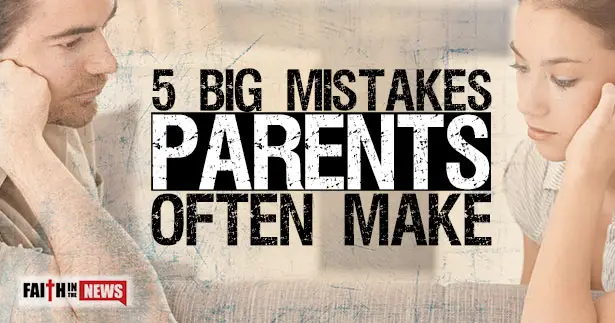Here are five big mistakes that a lot of parents make.
Disciplining in Anger
It is always good to discipline children, for this is biblical because “whoever spares the rod hates his son, but he who loves him is diligent to discipline him” (Prov. 13:24). However, discipline should never be done in anger because then it can easily become indiscriminate punishment. Punishment and discipline are not the same thing. Just before I disciplined my young son, I told him why I was doing it and that disobedience produces consequences, just as it does for adults. I told him that God disciplines us when we need it because He loves us, so giving an explanation for the reason of the discipline can give parents a small “cooling time” period and tell them that “the Lord disciplines the one he loves, and chastises every son whom he receives” (Heb. 12:6).
Saying but Not Doing
When we say one thing to our children but then do just the opposite, they are not really going to follow our instructions. They are not going to do what you say but what you do. It’s similar to the idea that your children can’t hear what you are saying because your actions are drowning out your words. Children can see the hypocrisy in their parents telling them to not do something but then they themselves do it.
Being Their Best Friend
I remember when I was teaching years ago. My wife, who was also a teacher, was trying to mentor a young man who had just begun teaching fourth grade. One of the biggest mistakes that he made was in trying to be the children’s buddy or best friend. He sought to be popular instead of respected. Rather than being the teacher, he wanted to be their friend, but he soon found out that the children took advantage of this kind of relationship and kept making excuses for not getting their schoolwork done. Parents are not their children’s best friend, pal, or “buddy.” They must be the parent, and that relationship must take precedence. Be the parent because most of them already have best friends.
Hypocrisy
When we show children that we are not always honest and lie about certain things, then they’ll see lying as a normal, everyday pattern. If a child is answering a phone call and told by the parent, “Tell them I’m not here,” the child then will see that lying is a way to get out of awkward or uncomfortable situations in life. You are modeling for them how to live, and they will take that model with them, for good or for bad, for the rest of their life. Even a half-truth is a whole lie.
Remaking You
Years ago I was a little league baseball coach, and some of the parents of the boys I was coaching were very hard on their young sons. Few ever gave a kind word of encouragement to them. Most were way too demanding of their abilities, which their skills at that age were not able to achieve. These parents had unreasonable expectations of their sons, and by putting pressure on them, it took all the fun out of the game for the boys. It is so easy to try and live our lives through our children, isn’t it? We might want to shape them, mold them, and form them into the image we have without realizing that they are not you or me! What we wanted for ourselves as young children might be what we unwittingly seek in them.
Conclusion
I know about mistakes that parents make because, as a parent, I made them. I’ve disciplined in anger, I’ve said one thing but did another, I’ve tried to be their best friend, I’ve been a hypocrite, and I’ve tried to put too much pressure on my own children. The most I’ve learned from my mistakes is to not repeat them. I hope and pray this helps you.
May God richly bless you,
Pastor Jack Wellman
Republished by Blog Post Promoter
 Faith in the News Christian News
Faith in the News Christian News



